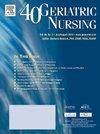Association of dietary pattern and cognitive function in the elderly: A systematic review and meta-analysis
IF 2.5
3区 医学
Q3 GERIATRICS & GERONTOLOGY
引用次数: 0
Abstract
Background
Cognitive dysfunction is one of the common geriatric syndromes, which is reported to be the fifth largest contributor to the global burden of disease. Whether specific dietary patterns are effective in improving cognitive function in the elderly remains controversial, therefore, this study will evaluate the relationship between healthy dietary patterns and cognitive function in older adults by means of Meta-analysis.
Methods
As of June 2024, MEDLINE, Scopus, PubMed, Web of Science, and Embase databases were systematically searched. Inclusion criteria include the participants were 60 years and older, the dietary pattern studied was specified in the study, and the clear and valid outcome indicators were provided. Review and conference papers, articles published in languages other than English, repeated publication of literature with the same content, and inability to obtain the full text and valid data will be excluded. OR values and 95% confidence intervals were extracted, and statistical heterogeneity was determined using I2 test. Publication bias was analyzed by Egger regression test. Due to high heterogeneity, sensitivity analysis, Meta-regression and Sub-group analysis were performed. The NOS and AHRQ scale were used to assess the quality of the study, and Stata17.0 was used for the Meta-analysis.
Results
Fifteen papers were finally included, with a cumulative sample size of 62500 cases. All included literature had a score≥6 after quality assessment. The pooled OR for the 15 studies was 0.60, with 95% confidence intervals ranging from 0.52 to 0.70. We found that a healthy dietary pattern can improve cognitive function in older people (z= 6.34, p<0.05).
Discussion
Sub-group analyses in this study did not identify sources of heterogeneity, and there is still a need to include more studies for more comprehensive analyses in the future. Healthy dietary patterns can effectively improve or delay cognitive decline in older adults, which can not only provide a direct guidance for the rational arrangement of daily diet for the elderly, but also provide a reference for clinical staff to provide dietary guidance for elderly patients.
Registration
The detailed study protocol can be found on the PROSPERO website.
(CRD42024559851)
饮食模式与老年人认知功能的关系:系统回顾与荟萃分析
认知功能障碍是常见的老年综合征之一,据报道是全球疾病负担的第五大因素。特定的饮食模式是否能有效改善老年人的认知功能还存在争议,因此,本研究将通过meta分析的方法来评估健康饮食模式与老年人认知功能的关系。方法系统检索截至2024年6月的MEDLINE、Scopus、PubMed、Web of Science、Embase数据库。纳入标准包括参与者年龄在60岁及以上,研究中明确了研究的饮食模式,并提供了清晰有效的结局指标。综述和会议论文、以非英语语言发表的文章、重复发表具有相同内容的文献以及无法获得全文和有效数据的文献将被排除在外。提取OR值和95%置信区间,采用I2检验确定统计异质性。采用Egger回归检验分析发表偏倚。由于异质性较高,进行敏感性分析、meta回归和亚组分析。采用NOS和AHRQ量表评估研究质量,采用Stata17.0进行meta分析。结果最终纳入文献15篇,累计样本量62500例。所有纳入的文献经质量评价得分均≥6分。15项研究的合并OR为0.60,95%置信区间为0.52 ~ 0.70。我们发现健康的饮食模式可以改善老年人的认知功能(z= 6.34, p<0.05)。本研究的亚组分析未发现异质性的来源,未来仍需要纳入更多的研究进行更全面的分析。健康的饮食模式可以有效改善或延缓老年人认知能力下降,不仅可以为老年人日常饮食的合理安排提供直接指导,也可以为临床工作人员对老年患者进行饮食指导提供参考。详细的研究方案可在普洛斯彼罗网站上找到。
本文章由计算机程序翻译,如有差异,请以英文原文为准。
求助全文
约1分钟内获得全文
求助全文
来源期刊

Geriatric Nursing
医学-护理
CiteScore
3.80
自引率
7.40%
发文量
257
审稿时长
>12 weeks
期刊介绍:
Geriatric Nursing is a comprehensive source for clinical information and management advice relating to the care of older adults. The journal''s peer-reviewed articles report the latest developments in the management of acute and chronic disorders and provide practical advice on care of older adults across the long term continuum. Geriatric Nursing addresses current issues related to drugs, advance directives, staff development and management, legal issues, client and caregiver education, infection control, and other topics. The journal is written specifically for nurses and nurse practitioners who work with older adults in any care setting.
 求助内容:
求助内容: 应助结果提醒方式:
应助结果提醒方式:


